Day 90, Thursday 28 October 2004
Departure from Madagascar
GPS: 21° 04.3' S 43° 42.0' E
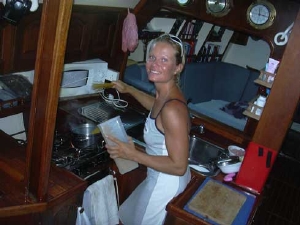 [Natascha
>>] [Natascha
>>]
We are beating against a 20 knots westerly wind, which makes life aboard a bit uncomfortable. Tossed around by the waves, we navigate through the saloon hanging off the hand railingslike apes rather than civilizedhumans. One hand for yourself and one for the boat is again the rule to live by. And whenever you do get sloppy, a sudden blow against the galley or the chart table quickly sorts you out. Not to mention cooking. Whatever you leave unattended, even for two seconds will get shoved off the galley, straight onto the floor, and with a bit of luck it will dribble between the floorboards which need to be lifted to clean properly. What a huge difference compared to the last few weeks downwind. Unnecessary to mention that there is an inverse relationship between the sailing conditions and our temper, occasionally leading to small outbursts. Some of them intense, fortunately all of them short and quickly forgotten.
[<< Natascha]
Day 91, Friday 29 October 2004
Mozambique Straits
GPS: 21° 43.5' S 41° 54.3' E
[Stefan >>]
The wind completely dropped off this morning which put the engine into action. The current quietness can be regarded as a true calm before the storm. According to Fred, the South African weather guru we catch on the HF radio, a south-easterly storm of 30 knots and more, combined with 15 to 20 foot waves with an interval of only 7 seconds will hit us tomorrow. In laymen terms: 5 to 7 meter breaking waves. Thanks but no thanks. The boat would undoubtedlybe fine and we would probably survive as well, but why invite trouble if you can prevent it by seeking shelter for a couple of days? Île Europe is only 80 miles away and will give enough shelter to sit it out. The approach of South Africa does indeed turn out on of the trickiest parts of the entire journey (we'll worry about the North Atlantic later).
A full day of motoring is never beneficiary to my mood, but when Natascha mentions that we run out of gas over lunch, I'm up for a new low. A full week of cold baked beans is not exactly my idea of nice food.
Suddenly, we hear "KEDENG!". What the hell is that? Did we hit something? Can only have been something floating as we are currently at a depth of about 3,000 meters. After a little round over the deck we find it. The genoa halyard broke. Oh well, we've had the forestay, this is something new to keep us entertained. I would need to climb up the mast to sort it out, to which I'm not looking forward out at sea. Since we're motor-sailing anyway it's just best to roll the genoa away and continue with just the main up and fix it in Île Europe.
This must be one of these days because when I come up for my watch at 2am the cockpit is soaked with diesel. The air vents of the diesel tanks that also work as overflow are positioned in the cockpit (not an ideal design). They spit out diesel if one of the tanks is overfull, which would be interesting given that we motored for a full day. While I'm cleaning out the mess with buckets of saltwater and loads of Dettol, I'm puzzling about the cause. It's actually chapter 88 of the book “Stefan and Natascha get to know Espiritu”.
Since we don't know our exact tank capacity - we can't see the current filling status of the tanks and we don't know the hourly usage of the engines (main and generator) - we are at risk of running out of diesel unexpectedly, probably at the worst moment possible. To avoid such surprises I closed off one of the two equally sized tanks, which will ultimately give me the following information: (1) how many engine hours we can do on one tank, (2) how many hours we have left on the second tank (3) after we filled up, the hourly usage of the engines. From previous tank fillings we do have some idea of the latter, but we need multiple measures to derive the individual usage from the combined usage (Total Usage = aX+bY=a'X+b'Y etc... – got it?).
We did 60 engine hours (no need for the generator with a broken fridge, grrr) and since I didn't expect to do more than 60 from here to South Africa, I decided to switch tanks and opened the port tank while closing starboard, which undefined residual contains are now kept as reserve. All nice and good, but as ever: the Devil is in the details. The detail concerned is the fuel return line of the engine that empties in the starboard tank. To guarantee sufficient fuel supply, an engine is such designed that the primary fuel pump provides an oversupply of fuel, regardless the actual demand, i.e. the revs per hour. Whatever is not used is via the return line pumped back into the tank, in our case the starboard tank. So after 8 hours, the engine pumped almost the entire port tank into the starboard tank via the return line, resulting in the overflow. This learns us three things: (1) the starboard tank was nowhere close to empty, (2) the engine uses a whole lot less than provided by the primary fuel pump and, most important, (3) Never, ever, ever close off the starboard tank!
[<< Stefan]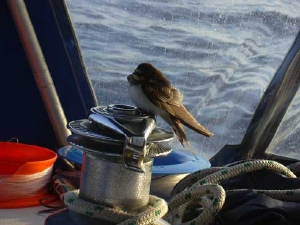 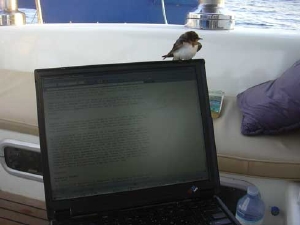
[Natascha >>]
A very cute birdie is paying us a visit. It's flying in and out of the saloon all day and fortunately it's a bit smarter than the one we had coming down from Hong Kong, who kept on crashing into the ventilators. It observes us (who's looking at who here?) sitting at the winches or the instruments. At one point of time it's so cheeky that it jumps on our heads and the edge of the laptop while I'm updating the log.
[<< Natascha]
Day 92, Saturday 30 October 2004
Île Europe
GPS: 22° 18.7' S 40° 20.2' E
[Stefan >>]
After motoring for almost 24 hours, we arrive at Île Europe at 05.00 in the morning. The water is so clear that even in the darkness, we can see the bottom at a depth of 10 meters. The anchorage is of a wall that drops from 2 to 300 meters in a matter of meters distance, which is far from ideal, although the risk when dragging anchor is minimal – the next stop is about 1,000 miles North and with only 5 boats in a huge bay it will be quite difficult to collide. Trick is now to drop anchor just between 10 and 15 meters of depth. Less than 10 meters brings us too close to shore and more than 15 gets a bit heavy in absence of the anchor windlass.
We barely switched off the engine when we hear some French sputtering over the VHF radio. The local gendarme demands to know what we're doing here, why we're here and when we're leaving again. In any case, they want to see us with our passports on the beach straight away. Errr, it's five in the morning, could we do it at about ten and catch a bit of sleep now? “Negative, tout de suite”! Could you confirm that please? “Affirmative, we expect you here at 05.30”! Right, so I launch the dinghy and motor over to Golden Sovereign, who was already there, to pick Clive up. Wish I didn't speak any French so that we could've slept first and worry about these guys later. Well, it's too late now.
There is a complete welcome committee waiting for us at the beach. Monsieur le Gendarme, a guy in running gear – looks like and conducts himself as an officer – and three privates armed with Uzis. It would've been even better if they would have taken defensive positions at the sides. The gendarme starts his “passage interdit” again and I explain that we were not meant to be here but that foul weather is coming up for which we would like to seek shelter. Looking at the blue skies he doesn't quite believe me and reluctantly he goes along for the day, but that's of no use since the front is expected to arrive tonight. Alright then, but we have to leave first thing tomorrow morning and we cannot come ashore. We agree for the time being assuming that they won't send us away when it's blowing 30 knots anyway.
Most probably we can't leave tomorrow morning as well but let's not stir things further up for the time being. And they can't send us away anyway because according to international sea laws, any country is obliged to provide shelter for bad weather for a minimum of 72 hours. If necessary, we can always bring this up later. By the way, they don't have any boats themselves, so what are they going to do, shoot us out of the bay? Unlikely.
Job for today: the broken genoa halyard. I brought clamps to join 6 mm cable especially for these instances where with some jury rigging you can at least reach the next port. I could just make a new eye for the halyard, but this will never be as strong as the original so I decide to do some swapping; promote the topping lift to genoa halyard and use the repaired halyard as topping lift, which takes a lot less strain than the halyard.
With the halyard already dropped out of the mast, it's relatively easy to tie it to the topping lift and feed it through the mast. Now we have the topping lift out, which needs to go through the halyard blocks in the top of the mast. I'm getting more comfortable with the height as I do it more often, but I do want to finish it before the South-Easter arrives. Armed with a fishing line with some lead at the end, I climb up to feed it from the top into the mast. A bit of angling with a little hook at the bottom of the mast to get it through the sleeve and there I have it. Now it's only a matter of sewing it onto the halyard and feed it through. Attach it to the sail, and we're good to go.
[<< Stefan]
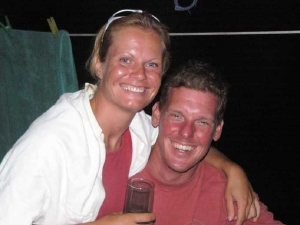 [Natascha
>>] [Natascha
>>]
Of course I assisted Stefan with the whole operation, but only when it was all done, it started dawning what the procedure was. Am I so dumb, or is he so smart? Nevermind.
And we have cooking gas again. Clive had one full spare bottle and was more than happy to give us the one they're currently using, which should still be half full. Pfwww, no cold baked beans and ravioli, but proper pasta with tinned tuna, tinned salmon, tinned ham or fresh fish – provided that we catch some. Reaching South Africa soon is indeed something to look forward to.
Later in the afternoon, two army guys come over snorkeling.Stefan recognizesthem as two members of the welcome committee. They ask if we need anything and give us some coke and beer as sign of goodwill to make up of their officers' misbehavior earlier that morning – at least that's how they felt about it. Some of the lower ranking soldiers objected against our treatment and two of them even didn't show up for breakfast in protest of the cold welcome. They tell that we caused quite some commotion turning up like that early in the morning – apparently without being detected earlier. As far as they know no other civilians ever stopped at the island and not knowing what to do, the safest response seemed to be to send us away. The “problem” was then taken up with their superiors in Reunion who confirmed that bad weather was indeed coming up and instructed the gendarme to leave us alone.
When Bedouin, Keren and Just Jinks go ashore to clear in later in the afternoon, the gendarme invites all of us for breakfast the following morning. Well, that's quite a turn around from this morning's welcome. They happily accept the invitation, out of courtesy and partially out of own interest should we need to stay longer. Meanwhile, the wind picks up to 30 knots causing a heavy swell that puts the boat in a rock 'n roll machine. We're definitely not moving very soon.
[<< Natascha]
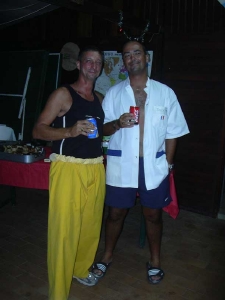 Day
93, Sunday 31 October 2004 Day
93, Sunday 31 October 2004
Île Europe
GPS: 22° 18.7' S 40° 20.2' E
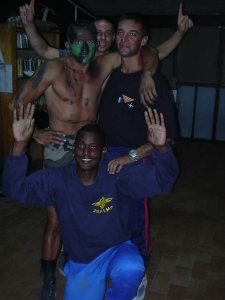 [Stefan >>] [Stefan >>]
We take back all unpleasant things we ever expressed about the French. The officer picks us up from the beach and brings us to the canteen in the main building where 12 guys and 3 girls in army green welcome us to their base. A long table is filled with fresh-baked scones, cake and coffee. The atmosphere is very relaxed and even the gendarme turns out to be a nice guy if you talk to him a bit longer. Typically French, first bark loudly and soften up if they get to know you better (any resemblance to dogs...? - sorry).
The soldiers talk about Halloween and the party they will be having tonight. This, of course, triggers Clive and especially John, party animal number one. "Why don't we bring some bottles of wine and whisky ashore and join in to have one big party. Ask them in French". When I translate the question, the whole table wakes up over the word “whisky” and collectively send a strong non-verbal message to the gendarme not to decline this offer. With even the officer in, the gendarme cannot do much else than reluctantly give in.
[<< Stefan]
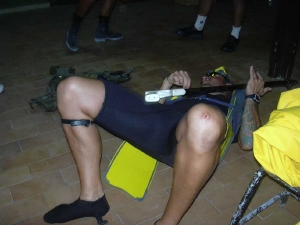 [Natascha >>] [Natascha >>]
And boy, what a party! Almost everybody is dressed up. The gendarme looks a lot more approachable in his white doctors' jacket which says: "Touch me". The officer is dressed up as a fisherman complete with yellow foul weather jacket and rod. Another guy put his wetsuit, dive mask and fins on – very convenient when dancing. Other than that plenty well-built guys in just army shorts and camouflage colours. Quite a paradise island this Île Europe!
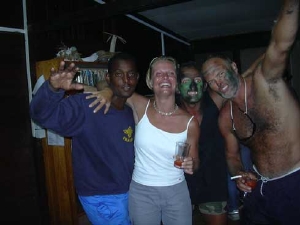 One of the welcome committee guys apologises again and mentions that the arms we're actually not loaded at all. Our visit is as special to them as it is to us. Day in, day out they see the same faces and with not much to do, everybody gets pretty bored. Guarding an uninhabited island and its palm trees does indeed not sound very appealing. The only reason for being there is keeping Madagascar away from confiscating the island for its fishing grounds. Not that France uses it in any way, but they want to hang onto this foothold for whatever future strategic reasons. One of the welcome committee guys apologises again and mentions that the arms we're actually not loaded at all. Our visit is as special to them as it is to us. Day in, day out they see the same faces and with not much to do, everybody gets pretty bored. Guarding an uninhabited island and its palm trees does indeed not sound very appealing. The only reason for being there is keeping Madagascar away from confiscating the island for its fishing grounds. Not that France uses it in any way, but they want to hang onto this foothold for whatever future strategic reasons.
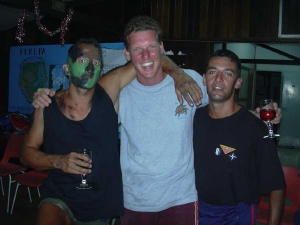 The officer bids us welcome in French, English and German (Dutch/Deutsch, nevermind) and announces the performance they put together for us: Four guys doing the infamous “YMCA”-act. Man what a show! Lots of cheering drives them even more crazy. A splendid way of getting a party going. The officer bids us welcome in French, English and German (Dutch/Deutsch, nevermind) and announces the performance they put together for us: Four guys doing the infamous “YMCA”-act. Man what a show! Lots of cheering drives them even more crazy. A splendid way of getting a party going.
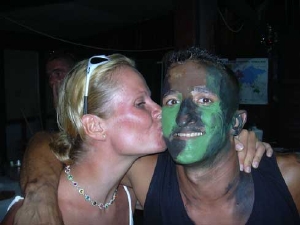 Everybody is dancing and John strips off his shirt, heavily enjoying his bottle of whisky. And that in a TL illuminated barrack! How you can create a party out of nothing! We brought six litres of it, together with two bottles of Baileys and four six-packs of beer. That and the 10 litres of fruit punch the French guys made did have it's expected result – we all got totally pissed. It's rapidly getting 22.00, our deadline to leave since the tide drops so low that it exposes the coral making it impossible to take the dinghies back to the boats. No problem for the French guys, they have plenty of spare beds available... Errr, better not. Everybody is dancing and John strips off his shirt, heavily enjoying his bottle of whisky. And that in a TL illuminated barrack! How you can create a party out of nothing! We brought six litres of it, together with two bottles of Baileys and four six-packs of beer. That and the 10 litres of fruit punch the French guys made did have it's expected result – we all got totally pissed. It's rapidly getting 22.00, our deadline to leave since the tide drops so low that it exposes the coral making it impossible to take the dinghies back to the boats. No problem for the French guys, they have plenty of spare beds available... Errr, better not.
On top of that, they also present us with an enormous amount of food. French cheese, chocolate cake, pizza and boxes full of jam, chocolate paste, honey and sugar. Unreal! Who could have imagined this yesterday morning? "Vive la France!!!"
[<< Natascha]
Day 94, Monday 1 November 2004
Île Europe
GPS: 22° 18.7' S 40° 20.2' E
[Stefan >>]
The wind is still far too strong to leave and frankly said: We don't mind at all. Everybody feels a bit off-balance since last night and we're all more than happy to relax and do a bit of nothing today.
Nothing, well not if you're on board Espiritu. When I stumble outside at 6 in the morning to take a leak from the aft deck, I see to my amazement that the outboard disappeared. I feared for this in Madagascar, but I can't see our new French buddies nicking our outboard engine. Contemplating what could have happened I finish my business staring expressionless down the water, when I vaguely distinguish a white shape a couple of meters down. Must be our white friend who is now resting at 25 meters deep on the bottom of the ocean. Oh well, that's something for after sleeping things off – there is no way I'm going to take the diving gear out in this state.
When I open my second eye, I suddenly see the security line of the dinghy going under and it even has tension on it. “Natas!! Get your butt out here and grab that line!” Still half asleep she crawls out and holds on to the line without having a clue why (as happens more often...). When she also spots the missing outboard it starts daunting what's going on. Together we haul the outboard up, which is dangling of its propeller that is entangled in the line. Five minutes later it's back on its spot on the aft railing.
What happened here? Not that the engine had much to say, but I do have an idea of what might have happened. We always tie the dinghy off with a second, more slack line as security for the night. It must have entangled itself around the propeller, which just took up all the slack leaving it as tight as the primary line. The rocking of the dinghy over the waves must have, bit by pit, pushed the outboard up until it came off the stern attachment and dropped under. Fortunately with the line still there. So far for Stefan Holmes' theory...
Retrieving is one, getting it to run again is a bigger challenge. It's crucial to clean it out immediately before the seawater corrodes moving metal parts such as the pistons and cylinders. So I open the carburetor, remove the spark plug from the cylinders and start washing the thing with fresh water to be followed by loads of petrol. Put the whole thing together and see if it will run again. Will it? Yes it will! After 20 attempts it sputters to life and roars at its full usual noise 30 seconds later. I put it back onto the dinghy to run it for a longer time to get rid of all the residual seawater that might still be in one of the compartments.
Finally, I would like to say for the record that this incident was completely unrelated to our state yesterday night. We always attach the dinghy this way to the boat and were just plain unlucky that this happened. Anyway, we will definitely find another way going forward. So far for the outboard saga.
John and I half-half agreed to go fishing in the afternoon, but given his current state he doesn't feel like. That is, Verna tells me she gave him his breakfast and put him back to bed and hasn't heard from him ever since. She does agree, however, that a round in a wet dinghy will probably sober him up, so she drags the poor lad out, puts a fishing rod in his hands and pushes him in my dinghy before he fully comprehends what's going on. There is a steep drop-off half a mile to the west, where the other guys picked up loads of fish yesterday. The French can only fish from shore and commercial fishing is not allowed, so there should indeed be plenty of fish.
I won't bore you with the details; just the results. After 45(!) minutes we had one kingfish - 30kg, one yellow-fin tuna - 25kg (sushi!), two travellis and a large mackerel. To that, we lost two lures and John lost three fish to the sharks who were quicker snatching than he could land them. Basically, we both had a strike each time we went upwind and by the time we reeled our fish in, we drifted so far back that we could do a next run upwind. Amazing. Who says fishing is dull? By the way, those sharks were large buggers. We saw one just under the dinghy (3.20m) and was significantly larger than our little boat. Shaun was driving his dad Clive mad that he wanted to surf there – now we see why he wasn't allowed to.
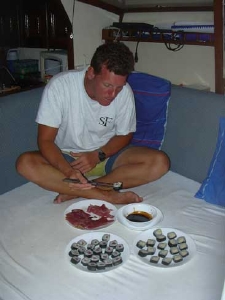 That large kingfish was a tough bugger by the way. Usually, two to three smacks with the hammer suffice but this one had a hard head. I slapped him about 25 times with full force, so hard that it would have killed a grown man and still it revived 5 minutes later. Only its last convulsions, but still. It also wrecked my beautiful, lethal repala lure when I brought it up. Because I fish with a handreel, there is no give as with a proper fishing reel that starts slipping if the tension exceeds 50 or 80 pounds, depending on its rating. Now, the full load is on the 200 pounds tested line, my little hands and the lure, and something has to go at some point of time. The repala has two triple hooks that curve back in a 180 angle. After the kingfish fight, this angle was reduced to barely 90 degrees. Too bad, but it wasn't for nothing!! That large kingfish was a tough bugger by the way. Usually, two to three smacks with the hammer suffice but this one had a hard head. I slapped him about 25 times with full force, so hard that it would have killed a grown man and still it revived 5 minutes later. Only its last convulsions, but still. It also wrecked my beautiful, lethal repala lure when I brought it up. Because I fish with a handreel, there is no give as with a proper fishing reel that starts slipping if the tension exceeds 50 or 80 pounds, depending on its rating. Now, the full load is on the 200 pounds tested line, my little hands and the lure, and something has to go at some point of time. The repala has two triple hooks that curve back in a 180 angle. After the kingfish fight, this angle was reduced to barely 90 degrees. Too bad, but it wasn't for nothing!!
[<< Stefan]
[Natascha >>]
It's already three months since we left Singapore in which we covered about 5,500 miles – that is 10,200 kilometers. For those interested, here are the details:
650 miles: Singapore - Merak Harbour / Indonesia
650 miles: Merak Harbour - Cocos Keeling
1.570 miles: Cocos Keeling - Chagos
980 miles: Chagos - Seychelles
850 miles: Seychelles - Madagascar
800 miles: Madagascar - Île Europe
That leaves us about 11,000 miles, (20,400 kilometers). So at a quarter of the journey, we've done a third of the entire distance. That's ahead of schedule, which is exactly what we need to spend two months in South Africa, where we plan to see more from the inland and have a proper holiday. I hear you thinking: “Isn't this a holiday then?”. No, it isn't. As far as we're concerned passages are like work with a rigid timetable for the day, unceasing attention and the continuous worry of what might happen. Not to mention the constant physical strain due to the movement of the boat. For those of you who don't believe me, come and join us for two weeks. You'll know exactly what we mean. Don't get me wrong, we don't complain because it is terrific, but it isn't a holiday.
[<< Natascha]
Day 95, Tuesday 2 November 2004
Departure from Île Europe
GPS: 22° 18.7' S 40° 20.2' E
Early morning I dinghy ashore with Shaun to give the guys a CD-ROM with pictures, two bottles of Amarula and a T-shirt for the gendarme. They are really disappointed that we are leaving because they were actually planning a nice lunch with us today. Incredible! We are almost tempted to stay one more day. What a great guys.
There is one last job before we can leave for Richards Bay. When climbing up the mast for the genoa halyard, I saw that the lower port shroud had three broken strands (of the 19). This shroud runs from the lower spreader aft to the deck and prevents the mast from pumping when the boat pounds into the waves. Typically, they take most strain when sailing upwind, having the waves on the nose. The damage probably occurred when beating out of Nosy Lava. At the time, we didn't have the running backstay set, which has a similar function and might have helped preventing this damage. Anyway, that's water over the dam – more important is how to solve it, hence, where to get a new shroud. Guess not. Luckily, the weather forecast shows steady easterly winds, which means we have the wind over our port side. Given that only the windward shrouds really work, the easiest solution is to simply swap port to starboard. Just keep our fingers crossed that the wind doesn't swing around...
[<< Stefan]
Day 96, Wednesday 3 November 2004
Mozambique Straits
GPS: 23° 33.3' S 38° 09.9' E
Those nightwatches are still a pain. Just as you're sleeping comfortably (kind of), you're woken up to sit outside in the chilly night for three hours. This not once, but two times a night since we do three-hour watches. Most of the time there is not much to do but sit on your butt and peer around every ten minutes for ships. Some other sailors are less diligent and set the radar alarm and simply go to sleep together, but even though we haven't seen a ship for weeks, we don't want to take the risk of being overrun. The more Southing we make, the colder it gets. I must say, living in the tropics for over two years did soften us – we get chilly over the slightest temperature drop and enjoy our fleeces and foul weather gear.
My empty, stress-free mind has all the time to think things through. Remembering the terrific time in Singapore and the friends we made there. Always lively Orchard Road, running in the botanical gardens, the Fullerton brunches, Emerald Hill's winebars and the fantastic pool at our apartment. My two Singapore employers. I learned a lot there, especially how not to manage a company and what not to do to motivate staff. Strictly short term thinking and fast cash. Never mind investing in training staff to make them grow and thus increase their productivity – that's concerned as a waste of time and money. For all, they should do exactly as the boss says, don't think themselves and work harder, preferably including weekends. And if staff walks out of the door that's only that they can't be trusted and aren't worth any investment. While I must admit that Dutch firms were a bit too soft when we left, this is certainly the other extreme.
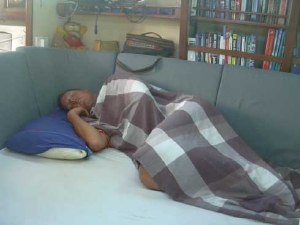 How will it be in the Netherlands again? What kind of job? Oh my, I do look forward to seeing family and friends again, our house, the beach and numerous other joys. It will be different not to be together constantly anymore. We will surely miss this slow, uncomplicated life. Nothing like “do you want pasta or shall I catch a fish” or “can you cream my back please?”. No, it will be more like “Honey, I'm running late tonight because we have this deadline and tomorrow I'm out for a training course”. “Oh, that's too bad, because I'm traveling the whole of next week”. I'm just glad we have a couple of more months left and when we do get home, we will probably blend in just as easy as we got used to this lifestyle. How will it be in the Netherlands again? What kind of job? Oh my, I do look forward to seeing family and friends again, our house, the beach and numerous other joys. It will be different not to be together constantly anymore. We will surely miss this slow, uncomplicated life. Nothing like “do you want pasta or shall I catch a fish” or “can you cream my back please?”. No, it will be more like “Honey, I'm running late tonight because we have this deadline and tomorrow I'm out for a training course”. “Oh, that's too bad, because I'm traveling the whole of next week”. I'm just glad we have a couple of more months left and when we do get home, we will probably blend in just as easy as we got used to this lifestyle.
Sailing has been splendid for the past two days. We are reaching in 12 to 20 knots of wind, and thanks to the current, we did 180 the first day and set a new record at 200 miles the second day!
Day 97, Thursday 4 November 2004
Mozambique Straits
GPS: 25° 41.1' S 35° 33.6'
Usually, the fastest route from A to B is a straight line... Not always though, like in this case when sailing from Madagascar to South Africa. Parallel to the Mozambique coast, you have the Aghulas Current that can run up to 5 knots. When doing 7 knots of boatspeed, you are actually covering 12 knots over the ground which is phenomenal. To fully benefit from this current you have to sail to Mozambique due west until you reach the 1000 meter line where the current is at its strongest.
The current can be a hazard though, if a cold front arrives with south-westerly winds. The fierce current against the wind creates enormous braking waves which you don't want to experience in a small boat. Should we get caught by a cold front, the best advise is to duck under the coast, about one mile from shore where the current is almost absent.
Fred the weather man tells us via the HF radio that a cold front with 25 to 30 knots of wind is expected for tomorrow late afternoon. Not too bad, but troublesome enough to be careful about. We discuss our options with the other boats and decide to push as hard as possible to get as close to Richards Bay as we can. We might make it, and if not, we only have a couple of miles of motoring ahead before reaching port. At midnight, we have 85 miles to go.
[<< Natascha]
Day 98, Friday 5 November 2004
Arrival Richards Bay (South-Africa)
GPS: 27° 10.6' S 33° 14.9' E
[Stefan >>]
Good news about the southwester that was forecasted yesterday. Fred doesn't say too much about it – we should only expect a moderate 15 knots from the south – and Chris from Bedouin talked to his father who lives in East London (South Africa) where the wind only shifted for half an hour before swinging back to the Northeast. He was speaking of a “non-event”. Piece of cake.
We comfortably continue towards Richards Bay doing 11 knots over the ground with help of the current and at 15.30 I decide it's time for a beer. Everything looks fine and I don't see any adverse indications – the sky is blue, the wind steady and the barometer doesn't drop at all. At 15.45, a cloud system comes in from the Southwest which swings the wind around. Only 17 knots and if it's for just 30 minutes it will be over before we know it.
Those 30 minutes have well past and so have the 17 knots. The sky is much darker and the wind increased to 25 knots, gusting to 30. We managed to reach the low-current section just under the coast and the waves drop of as predicted. It's only 25 more miles to Richards Bay, which should be achievable in about 4 hours. We motorsail against the wind with three reefs in the main and with a slight current in our favour we make nice progress. As soon as we come around the corner leading to the last 10 miles into Richards Bay, we get fully exposed to the wind and the waves double in size again. To that, the current reverses, slowing us down to 3 knots over the ground. Espiritu is bouncing from one wave to the other and normally we would hove to in these conditions. Now that we have only 10 more miles to go, we decide to continue motoring into it.
Just as we approach the port, the engine stops bursting out cooling water, forcing us to kill the engine. I open the engine room but can't find the cause of the problem. There is no air in the strainer, bleeding the exhaust hose doesn't help and the impeller is still fine. If anything it must be something more serious which I can't fix now anyway.
Natascha is getting a bit worried now. We don't want to sit out the 33 knots much longer, but entering an unknown harbour in such strong wind, without an engine in the dark is not exactly appealing either. Now that I write this, I must say I kind of agree to her reluctance. But you know, mind of his own, hey. I call port control to inform if we could anchor just behind the breakwater outside the shipping channel. Every South African knows what a south-westerly does. He agrees immediately, and kindly points out where best to anchor.
As soon as we enter the breakwater, we drop the main and continue under a tiny piece of genoa. When we reach the indicated spot, we roll the entire genoa away, head into the wind and start the engine to do the last meters (it will be fine without cooling for a couple of minutes). The bottom comes up from 13, to 10, to 7, and suddenly to 2 meters. Full reverse!! And there you go, the bastard revives and bursts big splashes of water as never before! In disbelief we look at the exhaust – are we dreaming now? Probably a test from Espiritu to see if we are worth sailing her. Well we are, but could we please do these tests at less awkward times?
There must have been an airlock after all which probably resolved itself when being in calm water again. Anyway, we circle two rounds to test that the revival is sustainable before we motor into the marina. Clive and Anne-Marie followed us on the radio and are still awake when we finally arrive at 2.30 in the morning. They stand at the dock to catch our lines and tie us off. What an awesome people!
[<< Stefan]
|


